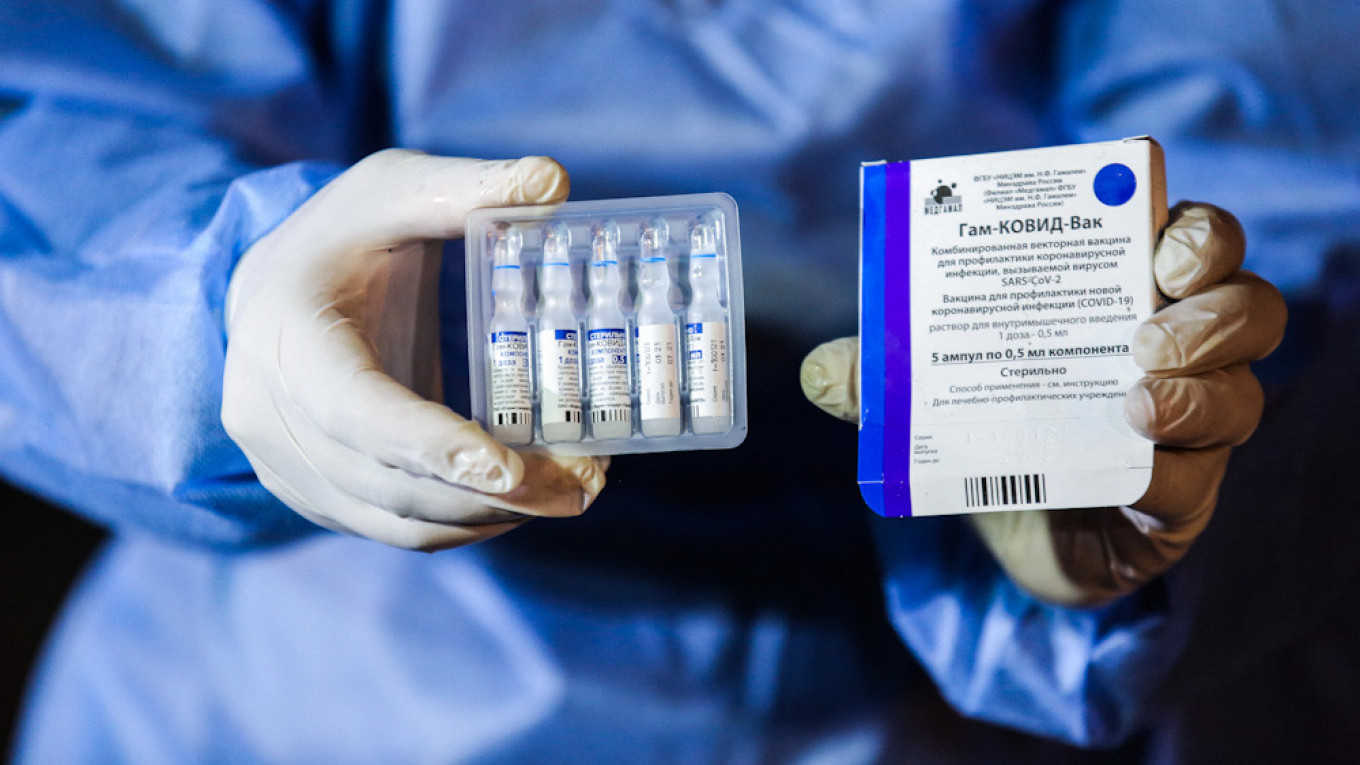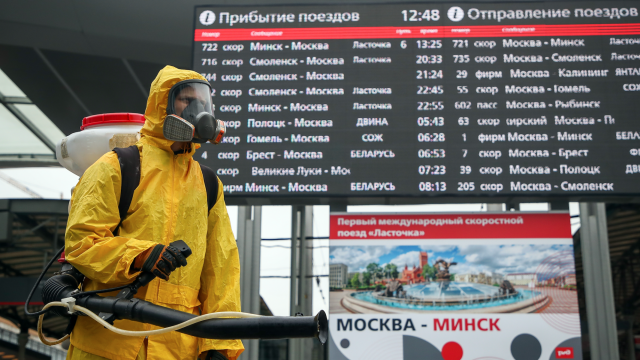Remember when the world was going to work together to beat coronavirus? While there is indeed much going on, from vaccine donations to the sharing of production facilities, of which we can all be proud, it didn’t take long for bad old habits to reassert themselves, too.
The sustained effort to denigrate the Sputnik V vaccine by some in the West is not only a depressing spectacle, it is a terrible blunder in both political and epidemiological terms.
Admittedly before international verification of Sputnik’s efficacy, in 2020 the U.S. Department of Health actively pressured Brazil not to adopt it, something it proudly lists as an achievement in its 2020 report.
Since then, European Commission President Ursula von der Leyen has darkly speculated about quite why Russia was making such a push to export the vaccine, and there continue to be regular warning about ‘Russian vaccine diplomacy’ as some kind of unspecific threat.
Meanwhile, Ukrainian president Zelenskiy banned Sputnik not just as the product of an "aggressor state" but also hinting that there was some nefarious goal, because "Ukrainians are not guinea pigs."
Of course, all this lends itself to enthusiastic whataboutism. What about Russian triumphalism, what about propaganda about Western vaccines spread by Russian sources?
Two wrongs don’t make a right, though, and the West aspires to a higher standard of discourse.
More to the point, it is not simply that efforts to prevent the take-up of Sputnik V are morally reprehensible, they are politically counter-productive.
In effect, it creates needless tensions and disputes in the West and ascribes to Moscow both power and a moral authority, without it having to do a thing.
Naturally, Moscow will capitalize on the prestige of having quickly come up with a highly effective vaccine.
The British have, after all, been happy to stress their role in the creation of the AstraZeneca AZD1222 vaccine — or, it is generally known in the U.K., the Oxford/AstraZeneca vaccine. Likewise, the U.S. can rightly be proud of the massive investment in research that was Operation Warp Speed.
More broadly, it was inevitable that Russia, a country suffering from a pretty dramatic soft power deficit, would extract what political capital it could from having a viable vaccine.
In part, the vaccine became a commercial proposition to offset the Russian Direct Investment Fund’s commitment, in part a political opportunity. Allies could be rewarded, and political fault lines in the West levered open a little.
However, why did adopting Sputnik become such a controversial political issue in the West? Why would it lead to Hungary — always the maverick — being condemned when it ordered two million doses, or the Slovak government losing its health minister and maybe even its grip on power when it followed suit?
In part, of course, this is a tale of the European Commission’s attempt to dictate the terms of the pandemic response and its woeful failure to deliver the quick results member states demanded.
More broadly, though, it is simply a reflection of the extent to which, especially since 2014, a climate of opinion has built up in some circles that sees Russia as irredeemably bad, mad and dangerous to know.
Furthermore, for some politicians and pundits, officials and opinion-formers, this has also become a professional gig.
Of course, Moscow has earned this reputation by annexing Crimea, intervening in the Donbass, spreading all kinds of malign disinformation, killing or trying to kill its enemies at home and abroad, the list is a long one. But that does not mean everything Russia does is wrong, that its scientists are not capable, and that its vaccines are not effective.
Many in the West seem to have accepted the kind of line articulated by Ukrainian Deputy Prime Minister Olha Stefanishyna, when she said “we are unofficially warning the EU that Sputnik V is 20% medical treatment and 80% hybrid threat and propaganda.”
She herself admitted that this was a political rather than medical or mathematical judgement, but nonetheless, by choosing to view Sputnik V through the "hybrid threat" lens, the West has weaponized it — and then turned it on itself.
There is, after all, no intrinsic political or other risk in countries using Sputnik, assuming it passes their regulatory checks. It could from the first have been treated as a simple and pragmatic transaction.
It is not like the NordStream 2 gas pipeline, which will have long-term implications for European energy markets. It is not like getting Rosatom to build you a new nuclear power station or buying S-400 surface-to-air missiles, which lock you into long-term supply and maintenance relationships. It’s just a vaccine.
Indeed, even if you vaccinate all or some of your population with Sputnik this year, that doesn’t for a moment mean you can’t use a different vaccine in 2022.
However, if a willingness to use Russia’s vaccine becomes some kind of political loyalty test, especially when there is still a distinct shortage of ample and affordable supplies of comparably effective alternatives, then this essentially becomes a demand that countries choose between, to put it at its most emotive, death or Sputnik.
No wonder countries turn to the cheap, efficient Sputnik. But in the process, what should have been a simple, uncontroversial healthcare choice becomes a political one. The West looks divided at best, heartless at worse, and Moscow gets to accrue a soft power advantage. (Or watch the West waste some of its own, which is almost as good.)
As if this were not bad enough, if there aren't enough AstraZeneca, Pfizer, Moderna and so forth vaccines to go round — and for the foreseeable future, there will not be — then where will countries forced or encouraged to eschew Sputnik have to turn?
To China, a country that really has adopted a pretty aggressive "vaccine diplomacy" campaign of its own, both to bat away claims that Covid-19 originated there and also to seize the opportunity for power, profit and prestige.
The trouble is that, just as the boy who cried wolf one day actually saw a wolf, so too Sergei Lavrov and Moscow’s other professional decriers of "Russophobia" may sometimes be right. One does not have to overlook the Kremlin’s many other transgressions to recognize that the moral panic over Sputnik V does no one any good.
A Message from The Moscow Times:
Dear readers,
We are facing unprecedented challenges. Russia's Prosecutor General's Office has designated The Moscow Times as an "undesirable" organization, criminalizing our work and putting our staff at risk of prosecution. This follows our earlier unjust labeling as a "foreign agent."
These actions are direct attempts to silence independent journalism in Russia. The authorities claim our work "discredits the decisions of the Russian leadership." We see things differently: we strive to provide accurate, unbiased reporting on Russia.
We, the journalists of The Moscow Times, refuse to be silenced. But to continue our work, we need your help.
Your support, no matter how small, makes a world of difference. If you can, please support us monthly starting from just $2. It's quick to set up, and every contribution makes a significant impact.
By supporting The Moscow Times, you're defending open, independent journalism in the face of repression. Thank you for standing with us.
Remind me later.








